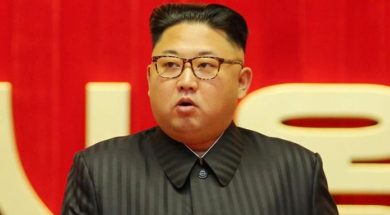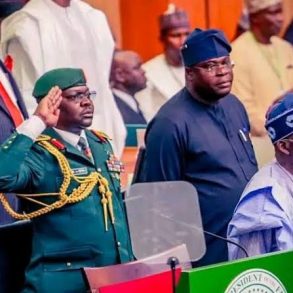North Korea has enshrined its status as a nuclear power in its constitution, with leader Kim Jong Un calling for more modern atomic weapons to counter the threat from the United States, state media reported Thursday.
Despite international sanctions over its nuclear weapons programme, North Korea has conducted a record number of missile tests this year, ignoring warnings from the United States, South Korea and their allies.
Diplomatic efforts to convince Pyongyang to give up its atomic arsenal failed, and the constitutional change came after Kim’s declaration last year that North Korea was an “irreversible” nuclear weapons state.
North Korea’s “nuclear force-building policy has been made permanent as the basic law of the state, which no one is allowed to flout”, Kim said at a meeting of the State People’s Assembly, according to the official Korean Central News Agency.
The rubber-stamp parliament met on Tuesday and Wednesday.
Kim said North Korea needed nuclear weapons to counter an existential threat from the United States and its allies.
The United States has “maximized its nuclear war threats to our Republic by resuming the large-scale nuclear war joint drills with clear aggressive nature and putting the deployment of its strategic nuclear assets near the Korean peninsula permanently”, he said.
Unacceptable
Kim described the recently enhanced security cooperation between Washington, Seoul and Tokyo as the “worst actual threat”.
As a result, he added, “it is very important for the DPRK to accelerate the modernization of nuclear weapons to hold the definite edge of strategic deterrence”.
Kim also stressed the need to push ahead with the work for exponentially boosting the production of nuclear weapons and diversifying the nuclear strike means, according to KCNA.
Neighbouring Japan, however, said North Korea’s atomic weapons programme was “absolutely unacceptable”.
“North Korea’s nuclear and missile development threatens the peace and security of our country and the international community,” Japan’s Chief Cabinet Secretary, Hirokazu Matsuno, said Thursday in response to the constitutional change.
“We will cooperate with the United States, South Korea and the rest of the international community towards the full implementation of relevant UN Security Council resolutions and the full denuclearisation of North Korea”, he said.
With North Korea’s nuclear status enshrined in the constitution, prospects of convincing its leadership to give up atomic weapons have dimmed, experts said.
“Kim’s speech… signifies the permanence of his nuclear force,” Yang Moon-jin, president of the University of North Korean Studies in Seoul, told AFP.





